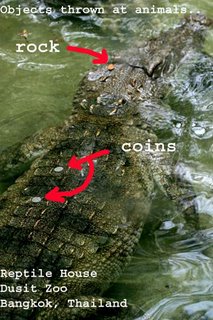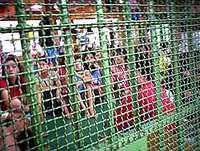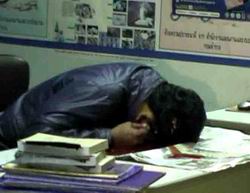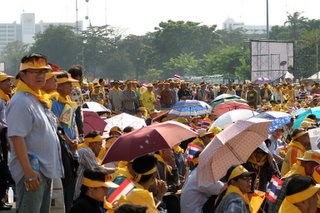from The Nation:
DEMAND FOR THAKSIN’S RESIGNATION: 100,000 rise against PM
Published on February 05, 2006
Biggest anti-government demonstration since the bloody 1992 ‘May Crisis’ throws his future and legitimacy into uncertainty
Thaksin Shinawatra, the embattled premier, yesterday suffered the biggest setback of his political career as nearly 100,000 Thais gathered at Bangkok’s Royal Plaza to demand his ouster in the largest anti-government rally in over a decade.
At the biggest show of people power since the bloody May 1992 uprising, which overthrew the Suchinda government, Thais of all walks of life from the capital and around the country chanted: “Thaksin get out. Thaksin get out”.
The largely peaceful protesters, many of whom wore yellow shirts, included disgruntled teachers, labour and community activists, environmentalists, provincial people affected by government policies and members of Bangkok’s middle-class.
Sources said up to 30,000 protesters came from the provinces, while the majority were middle-class and working people from Bangkok and nearby areas. Many protesters came with their families.
With the massive rally stretching from the statute of King Rama V to Rajdamnoen Avenue, protest leader and media mogul Sondhi Limthongkul said Thaksin no longer had the legitimacy to govern and the country was heading toward a crisis.
In another blow to Thaksin, Sora-art Klinpratoom, the information and communications technology minister, yesterday became the second Cabinet member to call it quit.
On Friday, Uraiwan Thienthong, the culture minister, citing the lack of political ethics over the Bt73-billion Shin-Temasek deal, tendered her resignation.
Sources said last night more Cabinet members could resign in coming days as public sentiment towards the government appears to have worsened.
For Thaksin, the political downturn has progressed rapidly over the past two weeks following his family’s Bt73-billion tax-free sale of 49 per cent of the shares in Shin Corp to Temasek of Singapore.
Besides the tax issue, the share sale has been severely criticised on other ethical and legal grounds, especially with regard to Ample Rich Investment Co, the tax haven set up by Thaksin in 1999.
Having learned that more Cabinet members would likely resign, Sondhi said the move could be seen as the TRT party’s tactic to prepare for Thaksin’s exit by dissolving the House.
Last night, sources said the Assembly of the Poor, which groups together about 20,000 people who say they have suffered from the government’s economic policies, and other non-governmental groups were planning to join the Sondhi camp in pressuring the premier to quit.
Pipop Thongchai, chairman of the Campaign for Popular Democracy, said he hoped the leadership for the anti-Thaksin rally would widen to sustain the momentum of “people’s power”.
Chaiyant Pholpoke, a former October 14, 1973 activist who joined yesterday’s rally, said he was surprised to see many people from different age groups and diverse backgrounds at the rally.
Sondhi, who handed over a seven-page letter to HM the King via an aide of General Prem Tinsulanonda at about 9pm, returned to the Royal Plaza to continue his leadership role.
According to his schedule, a videotape show highlighting the allegedly corrupt practices of the Thaksin government was to be screened at around 1.30 am after which the media fire-band would go on stage again to criticise the premier.
At 6 am, Buddha Issara was scheduled to deliver morning prayers and there was to be a merit-making ceremony for 99 monks. Sondhi said he would end the rally at 8am.







